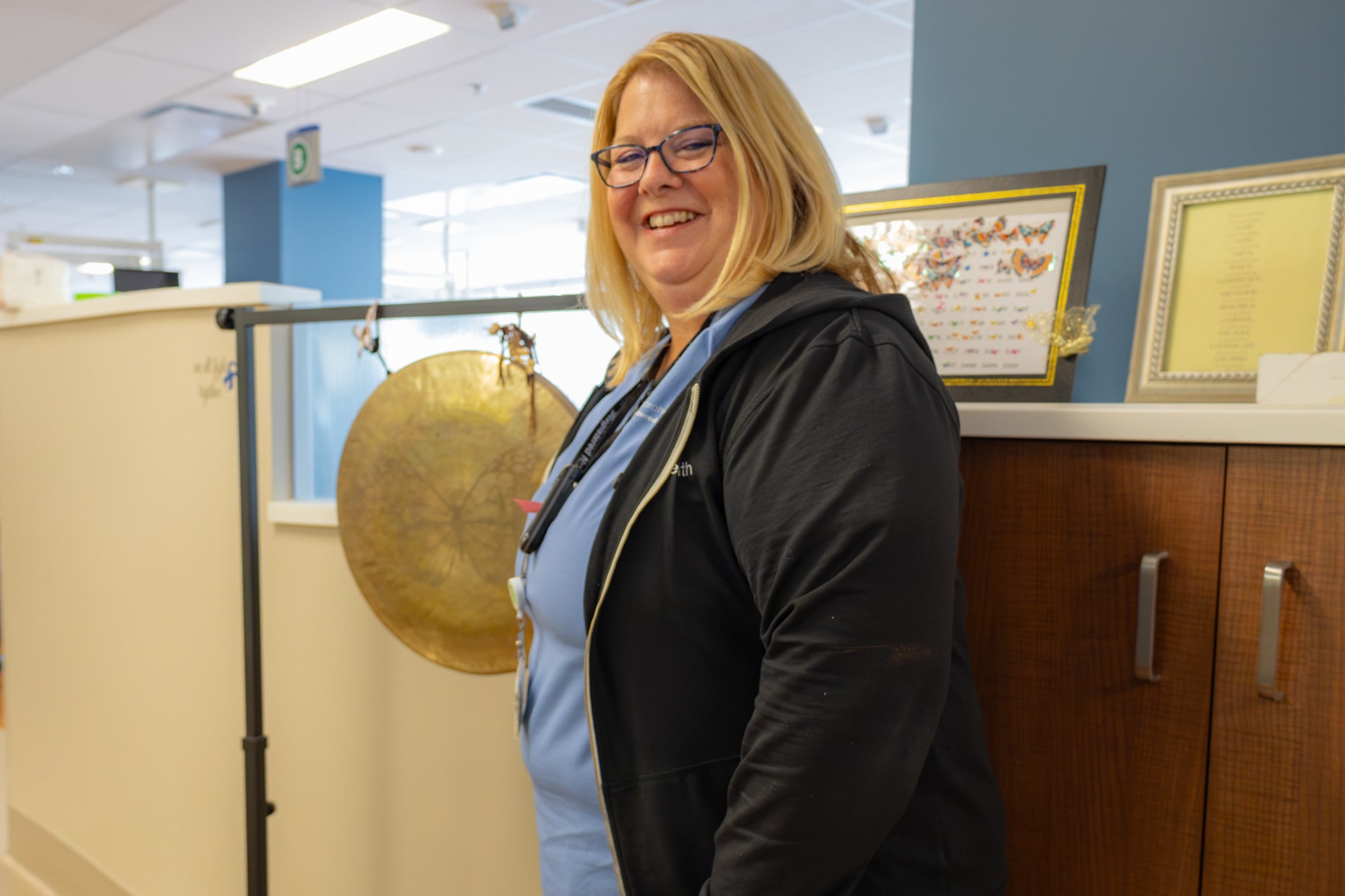
Registered Nurse Deborah Pogoda understands the importance of providing cancer care beyond patients' physical symptoms.
Along with the cutting-edge-treatment and medical expertise Niagara Health’s Walker Family Cancer Centre (WFCC) is known for, team members have a profound impact on the healing journey of patients.
For Beth Leclair, the compassion and emotional support of her care team has made the biggest impact on her journey.
“It’s never an experience anyone wants to go through,” says Leclair, who has been receiving breast cancer treatment at the WFCC since 2017. “You always hear about other people being diagnosed, but never think it could be you. It can feel like a roller-coaster of emotions.”
The stress of treatment was exacerbated during the height of COVID-19, Leclair says. With restrictions in place limiting visitors, she attended treatments alone.
While physically she might have been by herself, she never felt truly alone thanks to the emotional support of the WFCC team, especially her nurse Deborah Pogoda.
“I can’t say enough good things,” Leclair says about the WFCC registered nurse. “Deb always went out of her way to see me when I was on site. Not only did I feel informed about my physical health, she always asks about the rest of my life. It made me feel like more than just a patient.”
As a registered nurse, Pogoda works with patients in active treatment at WFCC. She meets with them in the clinic prior to treatment to discuss their pain level, any social issues they may be facing and offer emotional support.
Pogoda understands providing compassionate cancer care extends beyond patients' physical symptoms.
“It’s important to genuinely connect with patients, offer a shoulder to lean on and provide emotional support,” she says. “By addressing their fears, anxieties and concerns, we can truly make a difference in their healing journey.”
Providing collaborative patient-centered care
Delivering whole-person care is a job shared by many different departments inside the WFCC. Treatment often involves a multidisciplinary approach, Pogoda explains.
“A successful patient journey rests on the shoulders of countless dedicated healthcare professionals united by one shared goal to support patients,” she says.
This network of support was evident to Leclair from the moment she stepped foot in the centre.
Radiation oncologists collaborated closely with diagnostic imaging specialists to ensure precise targeting of the tumour. Surgeons interacted regularly with medical oncologists, discussing surgical options and seamlessly integrating them with radiation therapy schedules.
“I can’t say enough wonderful things about Dr. VanderMeer,” Leclair says about the WFCC Medical Oncologist. “She is proactive and never hesitates to send me for a scan or test if something doesn’t feel right.”
Nursing teams work collaboratively in both clinic and chemotherapy to support patients’ well-being during all stages of their journey.
And that just scratches the surface.
Throughout her journey, Leclair also encountered social workers, who acted as steadfast anchors, providing not just physical care, but also emotional comfort.
“They were supportive and easy to talk to,” she recalls.
Behind the scenes, pharmacists worked diligently to comb through patients' medication history and ensured precise dosing for treatment.
Dieticians work with patients to help answer dietary questions and host online nutrition classes to help patients stay healthy while on active treatment.
The Pain and Symptom Management team helps to give patients relief from pain and symptoms caused by cancer treatment.
Beyond the hospital walls, community partners play an important role in patients' care journeys. From home care services to support groups, teams work closely with community partners to ensure access to supportive resources and foster transitions in care.
“We take care of patients as a whole. This extends not only during their treatment, but after as well,” explains Pogoda.
Every second month, Pogoda teaches a Breast Cancer Survivorship class for patients who are finishing the active part of their treatment.
During the class, patients focus on transiting to life after breast cancer treatment, including how to take care of their physical, emotional and holistic self.
“It is common to have mixed emotions after patients finish treatment,” says Pogoda. “We support them during this next step and help them get back to feeling like themselves again.”
Breast Cancer Awareness Month
October is Breast Cancer Awareness Month, an annual campaign to raise awareness about the impact of breast cancer.
While many women may be hesitant or fearful about getting regular breast screenings, Leclair encourages more women to prioritize their breast health.
“It is important to stay vigilant about checking your own body,” she says. “Symptoms are not always obvious to detect; it could be a change in your skin, headaches or achy pains.”
Niagara Health has three full-service Ontario Breast Screening Program (OBSP) and assessment clinics located at the Niagara Falls, St. Catharines and Welland hospitals. Regular screening is important because it can detect breast cancer early when treatment has a better chance of working.
“You are your best advocate. Listen to your body and have regular screenings. You will be much better off knowing.”
To book a screening appointment, call:
St. Catharines OBSP Centre - 905-378-4647 x46345
Niagara Falls OBSP Centre - 905-358-4952
Welland OBSP Centre - 905-732-5434
Learn more about the Ontario Breast Screening Program.

